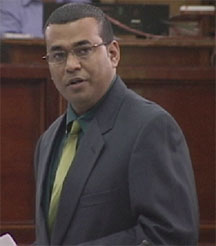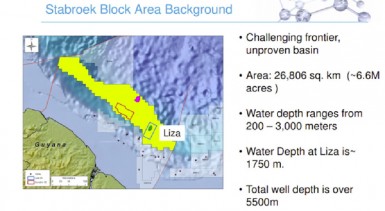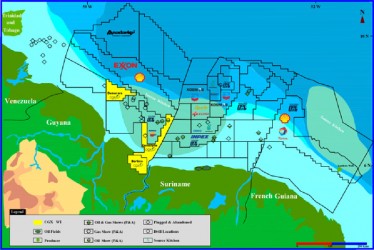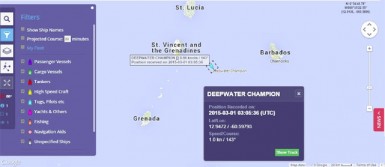Opposition offers full support
ExxonMobil’s exploration rig, the Deepwater Cham-pion remains en route to Guyana and the opposition has thrown its firm support behind government which has protested Venezuela’s objection to the planned search for oil in local waters by the US company.
“There has been no interruption or deviation from the schedule,” Minister of Natural Resources and the Environment, Robert Persaud told Stabroek News in a brief comment yesterday. According to tracking services, the Deepwater Champion’s estimated time of arrival off the Guyana coast is expected to be today. Last month, Exxon announced that the rig had been dispatched from Louisiana for the Stabroek Block offshore Guyana where it is expected to start drilling in mid-March.


On Saturday night, the Ministry of Foreign Affairs announced that it had written to its counterpart in Venezuela urging that Caracas desist from actions that could contravene international law and prevent development.
According to a statement from the ministry, Venezuelan Foreign Minister Delcy Rodríguez sent communication to the Country Manager of Esso Exploration and Produc-tion Guyana Limited, objecting to the dispatch of a rig to proceed with the exploration of an oil well in the concession granted by the Government of Guyana.
The Government of Guyana has dispatched a Note Verbale to the Venezuelan Foreign Minis-try.
“The Ministry of Foreign Affairs has requested that the Government of the Bolivarian Republic of Venezuela desist from taking any actions that could only result in the stymieing of the development of Guyana and its people and that would be in contravention of international law,” it said. Guyana had also informed Caricom, UNASUR, the Organisation of American States, the Commonwealth as well as the United Nations Secretary General about the recent action by Venezuela.
Stabroek News could not reach Minister of Foreign Affairs Carolyn Rodrigues-Birkett who was attending a meeting in The Bahamas yesterday.
Liza

The area where Exxon is expected to drill – identified as Liza- is well within Guyana’s waters off the Demerara area.
Yesterday, Opposition Leader David Granger said that Venezuela’s actions are provocative and “dangerous to peace” in the hemisphere. “APNU stands firmly behind the Government of Guyana in defence of its territorial integrity,” he asserted. “Venezuela has no legitimate claim to Guyana’s territory or territorial waters.”
Granger, a former army officer and also a historian noted that the border controversy was resolved peacefully over 115 years ago. He said that given the upheaval in Venezuela, the government of President Nicolas Maduro is trying to divert attention from its internal problems. “We are firmly behind the government in this matter,” he emphasised.
Leader of the AFC Khemraj Ramjattan also threw his party’s support behind government. “That (area) is, in international law, Guyanese territory,” he declared while adding that the claim by Venezuela is “wholly without merit.”
He characterized the development as “extremely negative” and said that ExxonMobil should move ahead notwithstanding Venezuela’s protests. The AFC leader said that Venezuela’s actions do not come as a surprise to him and emphasised the need for Guyana to make “strong statements” on the matter.
Ramjattan also said that he does not want a hostile and antagonistic relationship with Venezuela. He said that he was glad that Guyana had taken the matter to the United Nations and said that this is the appropriate procedure.
He also highlighted the political circus in Venezuela but said that this is no reason to deny Guyana its resources. Ramjattan said that the government and the future government will have to ensure that there is a workable solution to the matter. “We need to be allowed to exploit those resources,” he said noting that it is in Guyana’s territory.
Drilling

This is not the first time that Venezuela has objected to drilling in Guyana’s waters. On October 10, 2013, Venezuelan naval forces seized the MV Teknik Perdana, a seismic exploration ship indirectly contracted to US oil company Anadarko Petroleum Corporation Inc to explore the company’s Roraima Block offshore Guyana with a view to determining whether commercial quantities of hydrocarbon existed there.
Guyana has been adamant that the ship was intercepted in this country’s 200-mile Exclusive Economic Zone (EEZ). The 36-man multinational crew on the Malaysian-owned (Sapura-Kencana Petroleum) and the Panamanian registered oil survey vessel included scientists from the Texas-based researcher TDI-Brooks International.
The ship was intercepted by a Venezuelan naval vessel, the Yakuana, then ordered and escorted to the island of Margarita. Guy-ana demanded Venezuela’s explanation on why it seized a ship in Guyana’s waters, while Venezuela demanded an explanation from Guyana on why it gave permission for a ship to operate in its (Venezuela’s) waters.
Following the incident, a hastily arranged meeting between the foreign ministers of Guyana and Venezuela on October 17 resulted in a decision to have the countries’ technical experts meet in four months to discuss maritime delimitation. They also reiterated that dialogue and cooperation are the means for a peaceful solution of differences between States.
Caracas subsequently charged the captain of the vessel with allegedly violating Venezuela’s exclusive economic zone and the vessel and the rest of the crew were later released. The exploration plans of Anadarko have been put on hold.
The proposed meetings between technical teams from Georgetown and Caracas to discuss delimitation of the maritime boundaries of Guyana and Venezuela have also not been held due to the ongoing protests in the neighbouring country and other excuses offered by Caracas.
Rice
Venezuela is an important market for Guyana’s rice and under the PetroCaribe agreement, Guyana’s rice is bartered for Venezuelan oil.
It has been noted that the well that Exxon is due to drill is well within Guyana’s waters. Caracas has its own problems with ExxonMobil.

Last week, Reuters reported that Venezuela has requested the annulment of a World Bank tribunal award that orders that it pay Exxon Mobil Corp US$1.6 billion in compensation for nationalizations. The report said that delays to the enforcement of hefty arbitration awards grant Maduro’s government some breathing room as it struggles with a tumble in oil prices, arrears with private companies, debt payments, and campaigns for this year’s parliamentary election.
According to Reuters, the high-profile compensation case is typical of the sweeping nationalizations under the late Hugo Chavez’s 14-year rule. Chavez nationalized a range of oil projects, including the Cerro Negro heavy crude project and a smaller project called La Ceiba, both operated by Exxon. U.S. oil company ConocoPhillips has also filed for arbitration over the takeover of its oil projects in Venezuela.
Exxon had one of the largest exploration blocks offshore Guyana. In 1999, Exxon’s Guyana affiliate, Esso Exploration and Production Guyana Ltd (EEPGL), had signed a production sharing contract (PSC) with the Government of Guyana. This PSC covered the Stabroek Block, which Exxon was awarded during 1998. The Stabroek Block, licensed to Exxon, consists of 17 million acres off the edge of the continental shelf. Seismic work had commenced but had to be postponed because of the Guyana/Suriname maritime border dispute. The boundary dispute has since been resolved in the Permanent Court of Arbitration in accordance with the United Nations Convention on the Law of the Sea. However, as a result of the ruling, the company’s acreage has been reduced.
Guyana has also faced troubles on its eastern coast. In June 2000, a rig contracted by the Canadian oil explorer CGX Energy Inc was chased out of Guyana’s waters by Suriname gunboats as it was about to embark on drilling a well in the most promising area. This led to a diplomatic crisis between Guyana and Suriname and years of futile talks. The deadlock was broken when Guyana took its case to the International Law of the Sea Tribunal and secured a ruling largely in its favour in 2007.
Démarche
Venezuela’s démarche on EXXON underlines the volatility of its relationship with Guyana on the border controversy and maritime issues. While he had originally adopted a bellicose stance towards Guyana on border matters, the late Venezuelan President Chavez had softened his stance when he visited Guyana in 2004, stating that Caracas would no longer object to development projects in Essequibo. Since his passing, his successor Maduro has maintained a harder line, attributed to domestic pressures. And despite frequent references to good relations and bonhomie, Georgetown has not been able to dissuade Caracas from excursions like those which snared the MV Teknik Perdana.
Venezuelan objections to the Upper Mazaruni hydro project in the 1970’s were partially blamed for the collapse of the scheme.
Georgetown has been criticized for souring relations with the UK and the US on a variety of issues which could dampen its efforts to mobilise international support for its case against Venezuela. Its switching of support early in the Ramotar administration from the UK to Argentina over the Falkland Islands was seen as a key misstep as was its abstention at the United Nations on a vote condemning Russia’s annexation of Ukraine’s Crimea.









